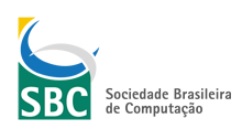Application of Workflow in Multi-Agent System Organization
Resumo
This paper presents a proposal for a model to integrate a workflow system into a multi-agent organizational model. Three alternatives are evaluated and the best alternative is integrated into the Moise organizational framework. An example of the chosen model is shown and a comparison based on workflow patterns is presented. The advantages of using this model are also discussed.
Palavras-chave:
workflow, agents, organization
Referências
Aalst, W.M.P. van der; Hee, K. van. (2002) “Workflow Management”: models, methods, and systems. London: The MIT Press.
Coutinho, L. R., Sichman, J. S., Boissier, O. (2006). Organizational Modeling Dimensions in Multiagent Systems. In: IBERAGENTS, Ribeirao Preto, SP, Brasil. Anais.
Decker, K.; Lesser, V. Task environment centered design of organization. In: AAI Spring Symposium on Computational Organization Design. Menlo Park: AAAI, 1994.
Dignum, V. A model for organization interaction: based on agents, founded in logic. Tese (doutorado) – Utrecht University, 2004. SIKS Dissertation Series No. 2004-1.
Dignum, V.; Meyer, J.; Weigand, H,; Dignum, F. An organizationaloriented model for agent societies. In: (RASTA ’02), at AAMAS, Bologna, Italy, 16 July 2002.
Ferber, J.; Michel, F.; Báez-Barranco, J. Agre: Integrating environments with organizations. In: Environments for Multi-Agent Systems. Berlin, Heidelberg: Springer-Verlag, 2005. (Lecture Notes in Computer Science, v. 3374), p. 48-56.
Hannoun, M., Boissier, Oliver ans Sichman, J. S., e Sayettat, C. (1999). Moise: Un modèle organisationnel pour la conception de systèmes multi-agents. Em Acts des tèmes Journèes Francophones Intelligence Artificielle Distribuée & Systèmes Multi-Agents. Hermès Science Publications.
Hübner, J. F. (2003). Um Modelo de Reorganização de Sistemas Multiagentes. Tese de Doutorado, Escola Politécnica da Universidade de São Paulo.
Okuyama, F. Y. (2008). Modelo MAS-SOC: Integrando Ambientes e Organizações para Simulações Baseadas em Sistemas Multiagentes Situados, Tese. UFRGS-RS.
Tambe, M. Towards flexible teamwork. Journal of Artificial Intelligence Research, v. 7, p, 83-124, 1997.
Tambe, M,; Adibi, J,; Al-Onaizan, Y,; Erdem, A,; Kaminka, G. A.; Marsella, S. C.; Muslea, I. Building agente teams using a explicit teamwork model and learning. Artificial Intelligence, v. 110, p. 215-239, 199.
Omicini, A.; Ricci, A.; Viroli, M. Artifacts in the A&A meta-model for multi-agent systems. Autonomous Agents and Multi-Agent Systems, Kluwer Academic Publishers, Hingham, MA, USA, v. 17, p. 432-456, 2008.
WfMC (2008). “Workflow Management Coalition Terminology & Glossary”, Document Number WFMC-TC-1011, Document Status - Issue 3.0.
Coutinho, L. R., Sichman, J. S., Boissier, O. (2006). Organizational Modeling Dimensions in Multiagent Systems. In: IBERAGENTS, Ribeirao Preto, SP, Brasil. Anais.
Decker, K.; Lesser, V. Task environment centered design of organization. In: AAI Spring Symposium on Computational Organization Design. Menlo Park: AAAI, 1994.
Dignum, V. A model for organization interaction: based on agents, founded in logic. Tese (doutorado) – Utrecht University, 2004. SIKS Dissertation Series No. 2004-1.
Dignum, V.; Meyer, J.; Weigand, H,; Dignum, F. An organizationaloriented model for agent societies. In: (RASTA ’02), at AAMAS, Bologna, Italy, 16 July 2002.
Ferber, J.; Michel, F.; Báez-Barranco, J. Agre: Integrating environments with organizations. In: Environments for Multi-Agent Systems. Berlin, Heidelberg: Springer-Verlag, 2005. (Lecture Notes in Computer Science, v. 3374), p. 48-56.
Hannoun, M., Boissier, Oliver ans Sichman, J. S., e Sayettat, C. (1999). Moise: Un modèle organisationnel pour la conception de systèmes multi-agents. Em Acts des tèmes Journèes Francophones Intelligence Artificielle Distribuée & Systèmes Multi-Agents. Hermès Science Publications.
Hübner, J. F. (2003). Um Modelo de Reorganização de Sistemas Multiagentes. Tese de Doutorado, Escola Politécnica da Universidade de São Paulo.
Okuyama, F. Y. (2008). Modelo MAS-SOC: Integrando Ambientes e Organizações para Simulações Baseadas em Sistemas Multiagentes Situados, Tese. UFRGS-RS.
Tambe, M. Towards flexible teamwork. Journal of Artificial Intelligence Research, v. 7, p, 83-124, 1997.
Tambe, M,; Adibi, J,; Al-Onaizan, Y,; Erdem, A,; Kaminka, G. A.; Marsella, S. C.; Muslea, I. Building agente teams using a explicit teamwork model and learning. Artificial Intelligence, v. 110, p. 215-239, 199.
Omicini, A.; Ricci, A.; Viroli, M. Artifacts in the A&A meta-model for multi-agent systems. Autonomous Agents and Multi-Agent Systems, Kluwer Academic Publishers, Hingham, MA, USA, v. 17, p. 432-456, 2008.
WfMC (2008). “Workflow Management Coalition Terminology & Glossary”, Document Number WFMC-TC-1011, Document Status - Issue 3.0.
Publicado
26/05/2013
Como Citar
NERI, José R. F.; HÜBNER, Jomi F.; SANTOS, Carlos H. F..
Application of Workflow in Multi-Agent System Organization. In: WORKSHOP-ESCOLA DE SISTEMAS DE AGENTES, SEUS AMBIENTES E APLICAÇÕES (WESAAC), 7. , 2013, São Paulo/SP.
Anais [...].
Porto Alegre: Sociedade Brasileira de Computação,
2013
.
p. 35-40.
ISSN 2326-5434.
DOI: https://doi.org/10.5753/wesaac.2013.33166.



